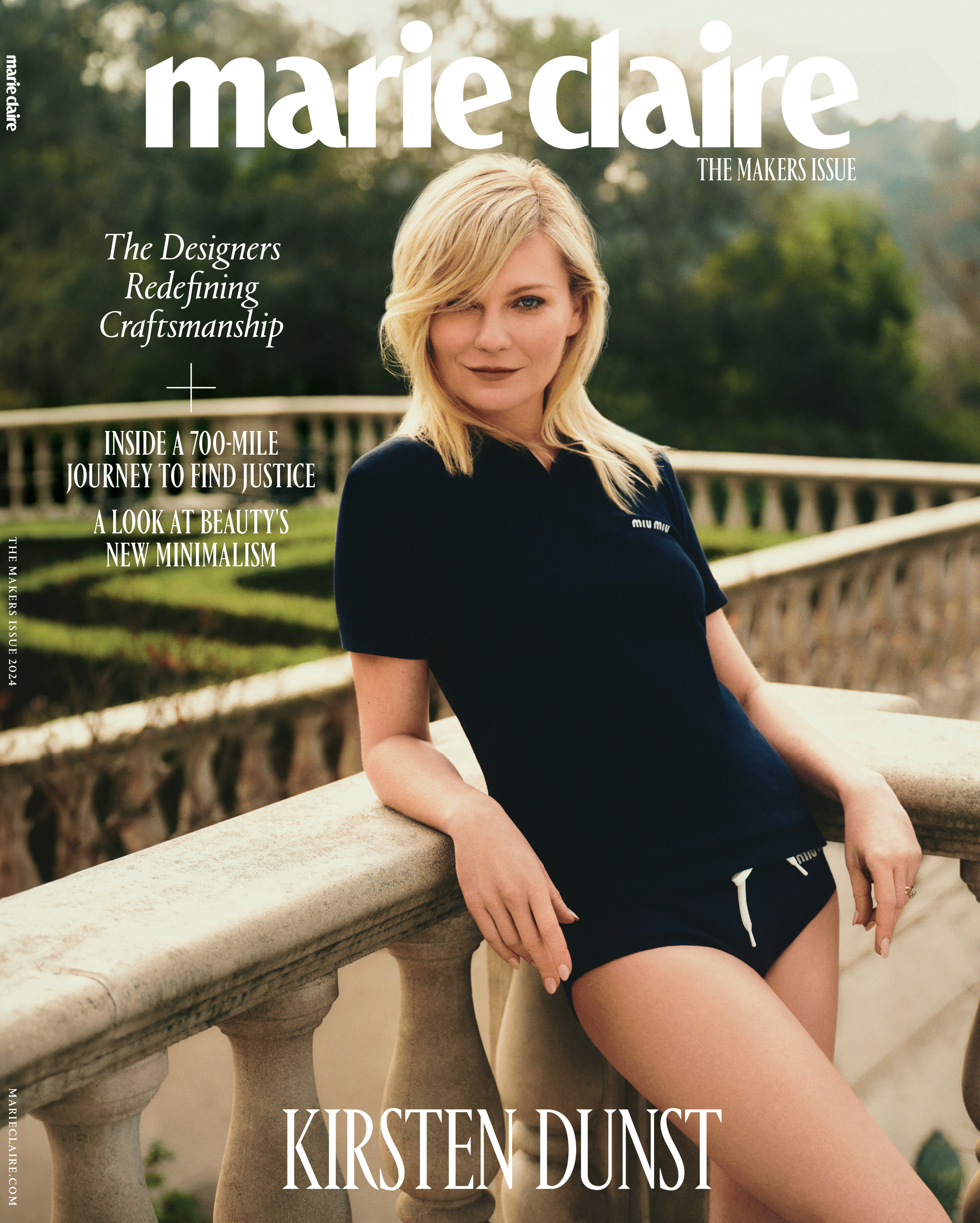Kirsten Dunst Is Back in Action
She's one of the most accomplished actresses in Hollywood, but since becoming a mom and turning 40, has dealt with being typecast. Now, after a two-year hiatus, she's returning to the big screen in an unexpected, new role.
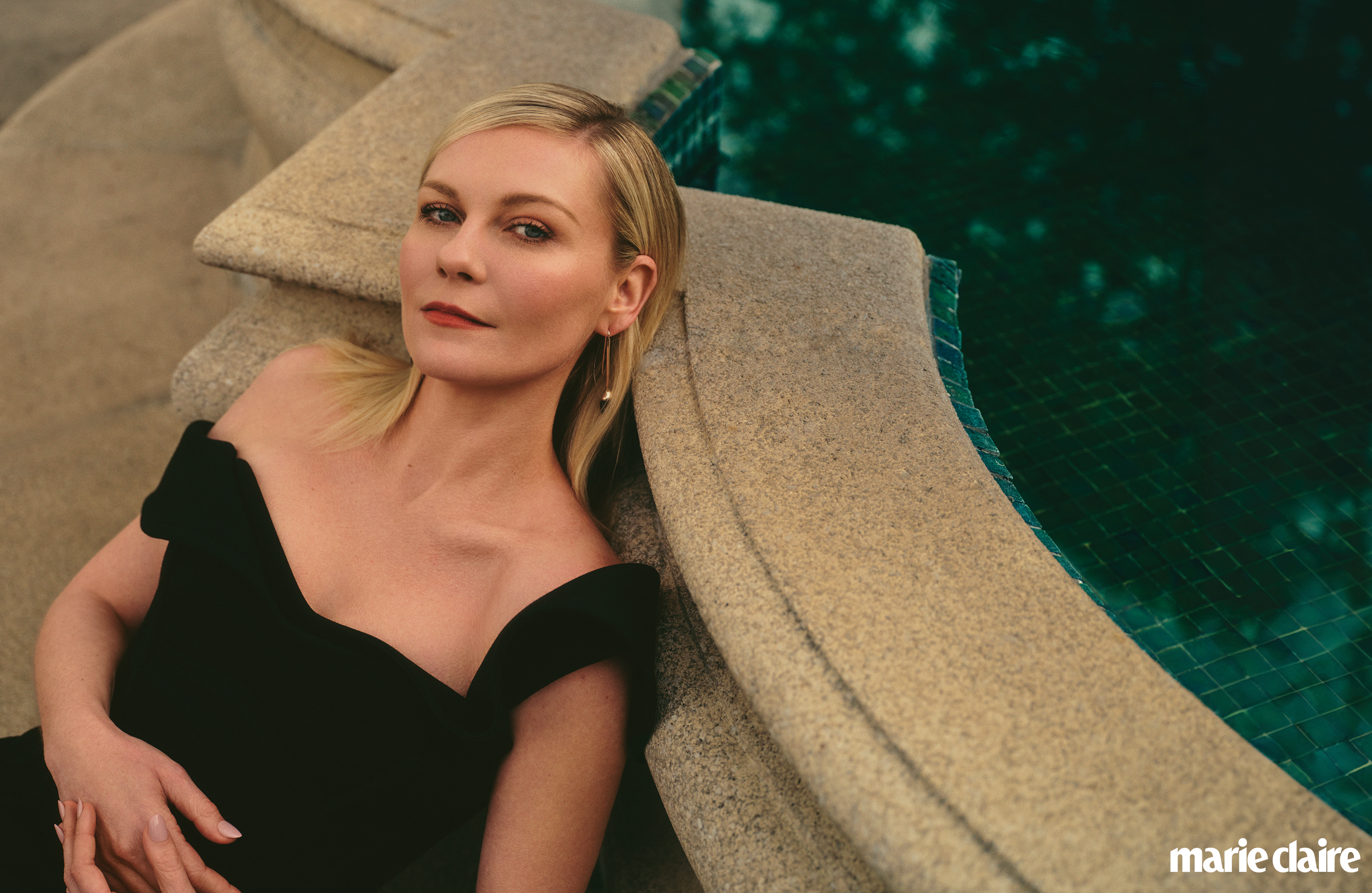
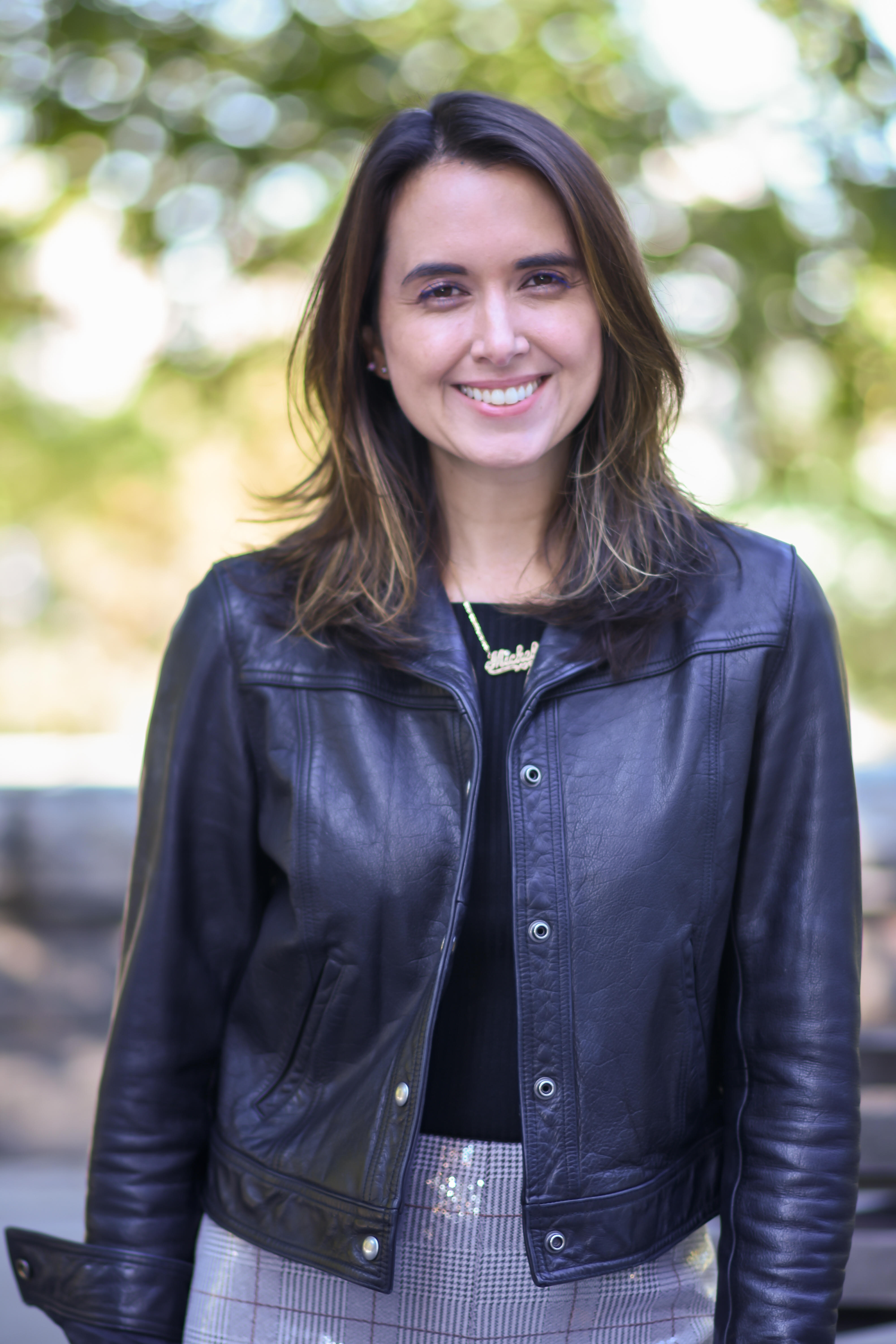
It's 2 p.m. on a drizzly Thursday in Hollywood, and I'm rug shopping with Kirsten Dunst. In the grand tradition of celebrity profile activities—yoga, pottery, picking at salads at iconic hotels—I meet the Oscar-nominated actress and millennial touchstone at Nickey Kehoe, the chic cottagecore interiors institution filled with splattered dishware, squirrel salt-and-pepper shakers, and vintage floral pillows.
This experience should be at least a little awkward, but Dunst, 41, makes it instantly, almost bizarrely, normal. After going in for the hug, she admits, with the intimacy of an old friend, that she's kind of tired. I ask why, then start to answer my own question at the same time she does: "Children."
In the middle of the night, her 2-year-old son, James, burst into her bedroom, demanding that Dunst make space for him in bed. A fellow survivalist parent, Dunst lets James sleep with her while her husband, actor Jesse Plemons, is in New York. She enjoys the coziness, even his "stinky breath." But then her aging beagle also woke her, needing to be let out. Dunst has a similarly relatable approach to the couple's eldest son, 5-year-old Ennis: "Look, he's eating three lollipops at once," she later showcases the camera roll evidence. "He discovered Weird Mario on YouTube."
We only just met beside an ocher velvet couch, but I get why Dunst suggested this luxuriously twee venue. When you have two kids under 6, an unencumbered rug-hunting jaunt counts as an indulgence. "I'm, like, a Volvo soccer mom right now," she says of her current phase of life. "Selfishly, I was just like, I want to go shopping."
Dunst sets aside the small woven rug she came for, plus a butter dish topped with a tiny ceramic bluebird, and some striped hand towels that fit her antique aesthetic: "They already look dirty, which is nice," she says. The gracious salespeople's eyes brighten ever-so-slightly at the sight of her, but they treat her normally. Dunst seems to want to downplay herself, too. She's wearing a red sweater that she pointedly tells me has a hole in it, wide-leg Levi's khakis cuffed at the ankle reveal white socks ("These are from Amazon," she says, lifting her foot) and gifted chunky Dior loafers. "I don't spend money like that on shoes," she says. A self-identified homebody in the low-key, ostensible suburb of Toluca Lake, "I'd rather buy nice towels."
It's only when we happen upon a $270 candle in the shape of a Marie Antoinette bust that we can no longer pretend Dunst is just a cool, off-duty mom. The wax queen is a reminder of who she once was: the It Girl of Sofia Coppola's lush 2006 historical drama. And who she's become: a young veteran with a sprawling filmography who somehow managed to evolve from child star in Jumanji to upside-down kissing Spider-Man in the rain to indie darling in Eternal Sunshine of the Spotless Mind. Now, the actress known for wooing prestige directors like Coppola and Jane Campion is on the verge of another new frontier: dark action heroine in A24's dystopian thriller Civil War (more on that in a minute).
Dunst's canon could (and perhaps should?) populate its own film festival, but even after more than three decades on-screen, she wears her status lightly, like the Dior loafers with the Amazon socks. "That's hilarious," she says off-handedly of the Marie Antoinette bust, but she doesn't linger, seemingly more interested in earthy incense known to mask the scent of her dog's pee. Coppola's French Revolution is almost 20 years in the past, and Dunst is confronting a new battle: what it means to age in an industry she knows all too well.
Stay In The Know
Get exclusive access to fashion and beauty trends, hot-off-the-press celebrity news, and more.
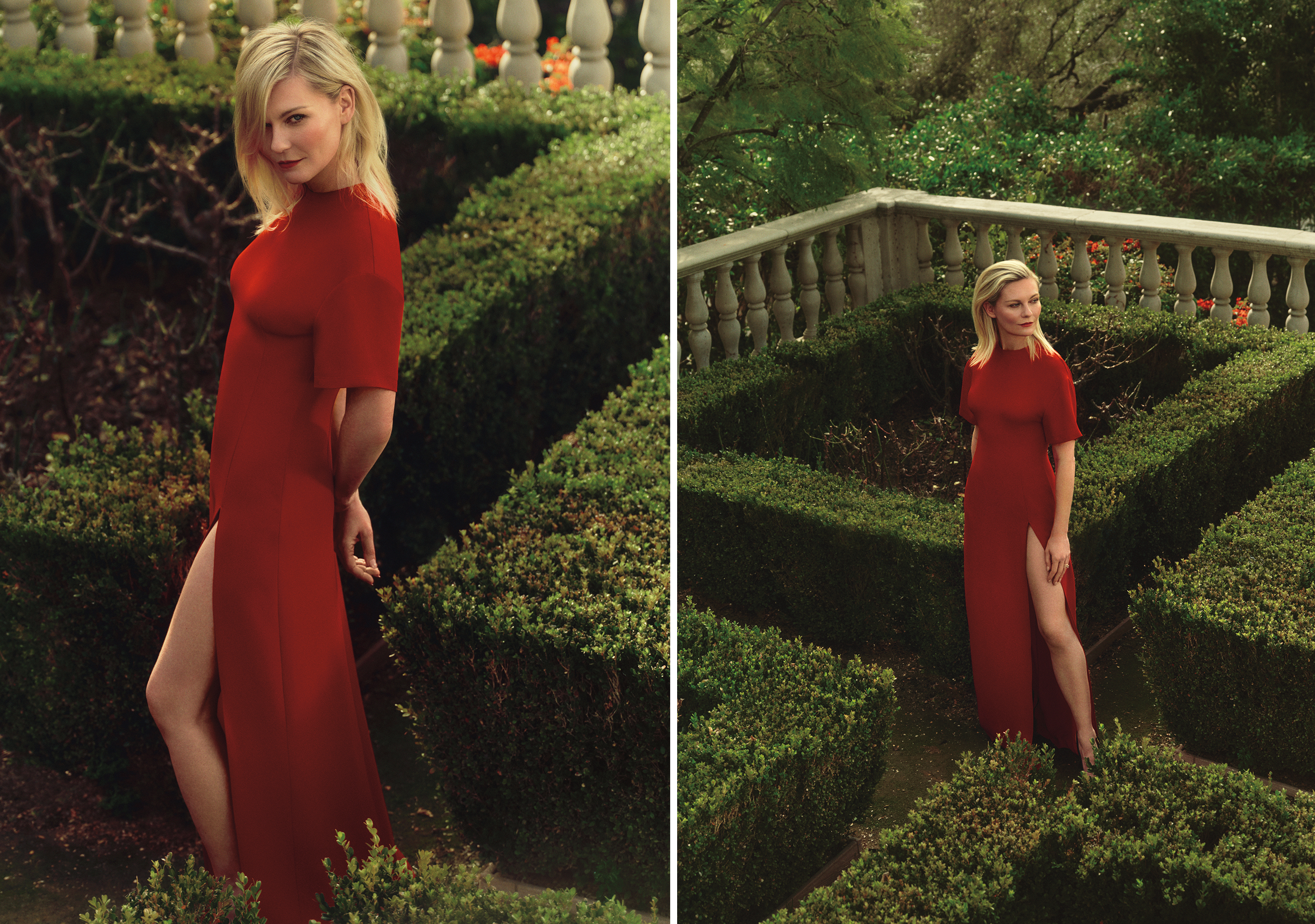
Valentino dress
This is Kirsten Dunst's first interview in two years, she tells me as we cross Beverly Boulevard to Angelini, a quaint Italian cafe from which she often orders on Postmates. That's because "I haven't worked in two years," she says over necessary espresso. After Campion's The Power of the Dog, for which Dunst, long deemed underrated, finally got her best supporting actress nomination from the Academy, "every role I was being offered was the sad mom," she whispers, lowering her voice, as if those casting directors are seated beside us.
Dunst had just portrayed a crumbling mother and wife of a ranch owner, played by Plemons. It was demoralizing to see her options narrow; to experience firsthand Hollywood's gender-specific ageism. There's a twisted irony to it, too: to be typecast in a variation of the role she's playing in real life—though, to be clear, Dunst is currently a tired mom, not a sad one—even after she actively defied pigeonholing throughout her career. Seeing the nuance in women over 40 is hardly her industry's strong suit, but both undeniably are true: Dunst is in the thick of it with her sons and she's an Oscar-nominated Hollywood lifer who still wants to lose herself in the kind of meaty roles that are actually worthy of her.
Not working the past two years, Dunst reveals, "To be honest, that's been hard for me...because I need to feed myself. The hardest thing is being a mom and...not feeling like, I have nothing for myself. That's every mother—not just me."
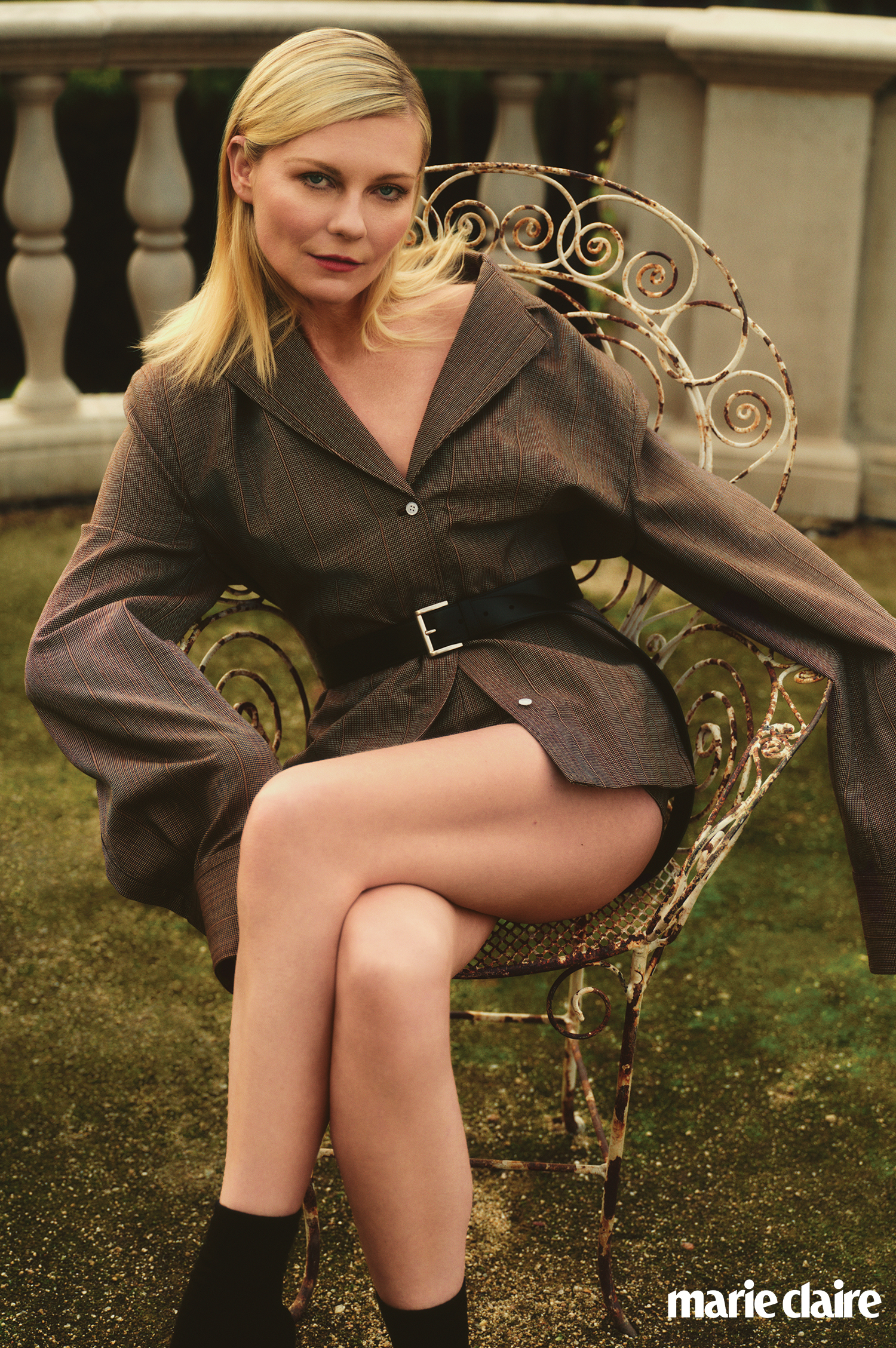
Prada jacket, shorts, and belt
She adds matter-of-factly, "There's definitely less good roles for women my age."
"Do you feel that already?" I ask, incredulous on her behalf and also insulted because we are the same age.
Dunst doesn't blink. "Yes," she replies. "That's why I did Civil War."
Instead of surrendering to sad motherhood, Dunst hard-pivoted to what she calls "elevated action" in the provocative new film from cult director and screenwriter Alex Garland (Ex Machina; Never Let Me Go). In Civil War, a dystopian U.S. is torn apart by a third-term president gutting governmental agencies (an eerie Nick Offerman) and 19 states have seceded, with California and Texas forging a "Western Forces" alliance. Dunst stars as steely photojournalist Lee Smith, who consistently risks her life covering the American war zone on a harrowing, bloody odyssey with press colleagues played by Priscilla star Cailee Spaeny, Stephen McKinley Henderson, and Wagner Moura.
"When I read the script, I thought, I've never done anything like this," Dunst says. It was exciting to be offered something fresh, especially because Dunst, an admitted nerd for directors, admired Garland: "I just love that he's someone who pushes boundaries." For Garland, Dunst's long career was an asset to a character he felt needed "to have lived," he says in the film's production notes. "Kirsten is just a first class actor," Garland tells me in an email. "She has a deep level of craft, and crucially for this role, she has soul. It's in her eyes, and her gaze, which felt perfect for a photographer."
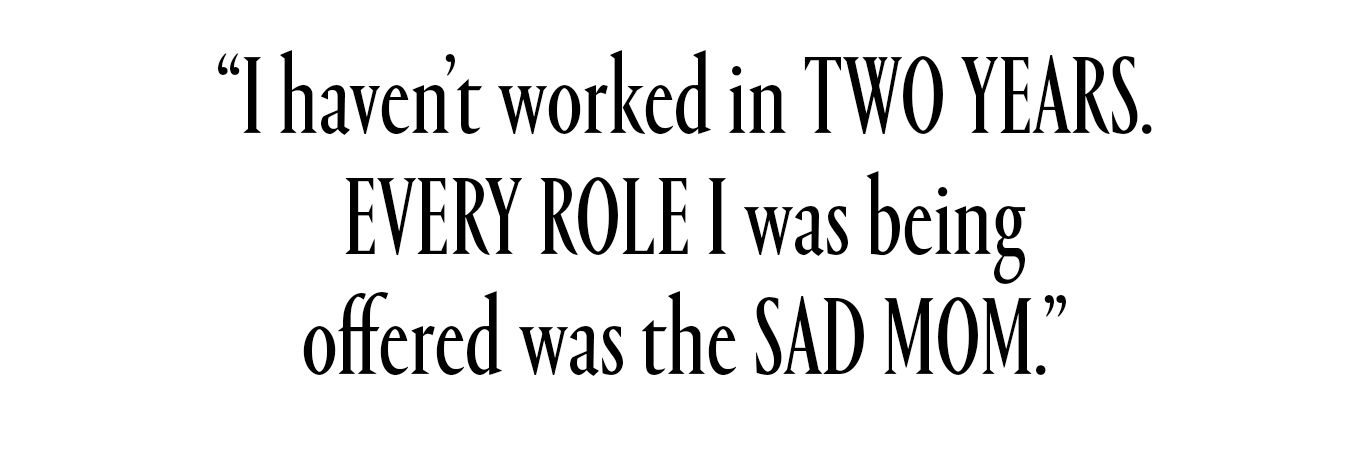
Civil War is explosive and graphic, filled with hyper-realistic battles, and because it's A24, some are set to electro-punk. Surreal shots like the ravaged Lincoln Memorial were green-screened, but the shoot in rural Georgia, including combat scenes and at least one car chase, "shook me to my core," Dunst says. "I remember hearing them practice an explosion. We were in the hair and makeup trailer, which was very far away from set, and the whole trailer shook." Another dramatic scene set in the White House hit disturbingly close to home. "There's so much gunfire, and then you look at the news and it's a school shooting again," Dunst says.
The film got under Dunst's skin, as merely watching it did mine. She "had PTSD for a good two weeks after. I remember coming home and eating lunch and I felt really empty." It seemed to Garland that she "let herself live inside the film, and feel the reality of the moments."
As number-one on the call sheet, Dunst led on-screen and off, according to the director. "Kirsten is far more experienced at filmmaking than I am. She's been doing it longer, and has made many more movies," Garland says. "Working with her was often educational. She would have an idea for a scene that didn't just help with the drama, but made it easier to achieve." His favorite was one of the film's quietest, in which Dunst talks with fellow journalists (played by McKinley Henderson and Moura) in a hotel bar. "It was a masterclass in acting ability," Garland says. "Gently witty, very precise, and very human."
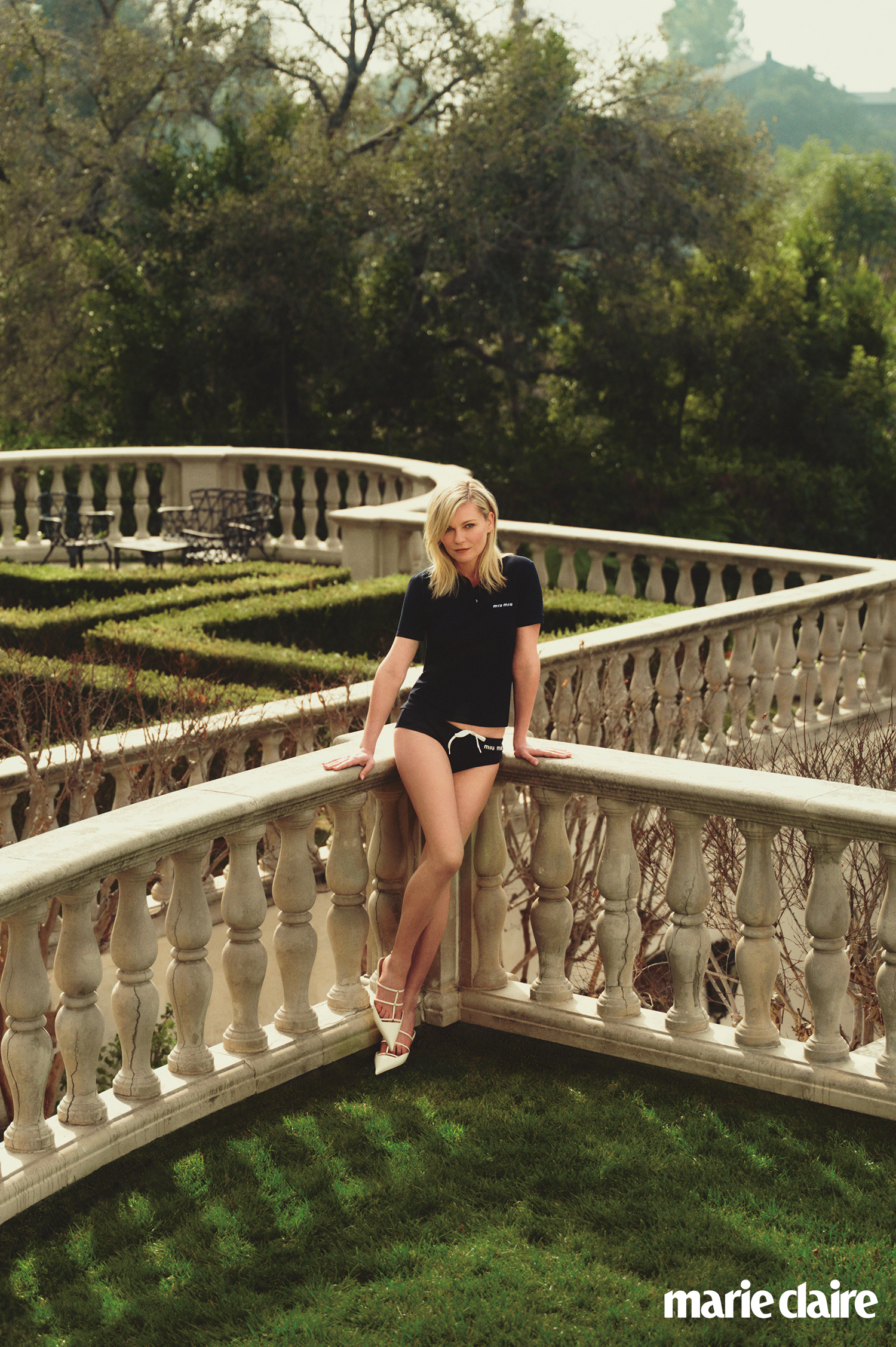
Miu Miu top, briefs; Valentino Garavini shoes
Perhaps the most disturbing part of Civil War is that it doesn't feel quite as divorced from reality as it should. Riots flashing through the opening credits call to mind the insurrection on our nation's Capitol, though Garland wrote the script before January 6. It's not clear which factions are "good" or "bad," and that's precisely the point. Landing this April in a hotly divided election year, "I think it's a cautionary tale," Dunst says, "a fable of what happens when people don't communicate with each other and stop seeing each other as human beings."
I ask if Dunst, who endorsed Bernie Sanders in 2020 and has a German passport thanks to her German father, Klaus, would emigrate if Donald Trump is reelected. "He can't win. I honestly feel like...we just need a fresh start. We need a woman," Dunst says, although speaking generally and not as an endorsement of any particular candidate. "All the countries that are led by women do so much better."
In a rare move for a film about conflict, Civil War centers its female leads. Dunst's grizzled Lee is thrust into the role of reluctant mentor to Spaeny's Jessie, a wide-eyed aspiring photographer who worships her. A version of that dynamic translated off-screen. "A lot of times when you're working with established actors, they have a wall up, but with Kirsten, almost immediately you could tell that she wears her heart on her sleeve...I think that's what makes her performances so heartbreaking and haunting. She gives a piece of herself to every film," Spaeny, 25, told me of Dunst, whom she grew up admiring in Jumanji and The Virgin Suicides.
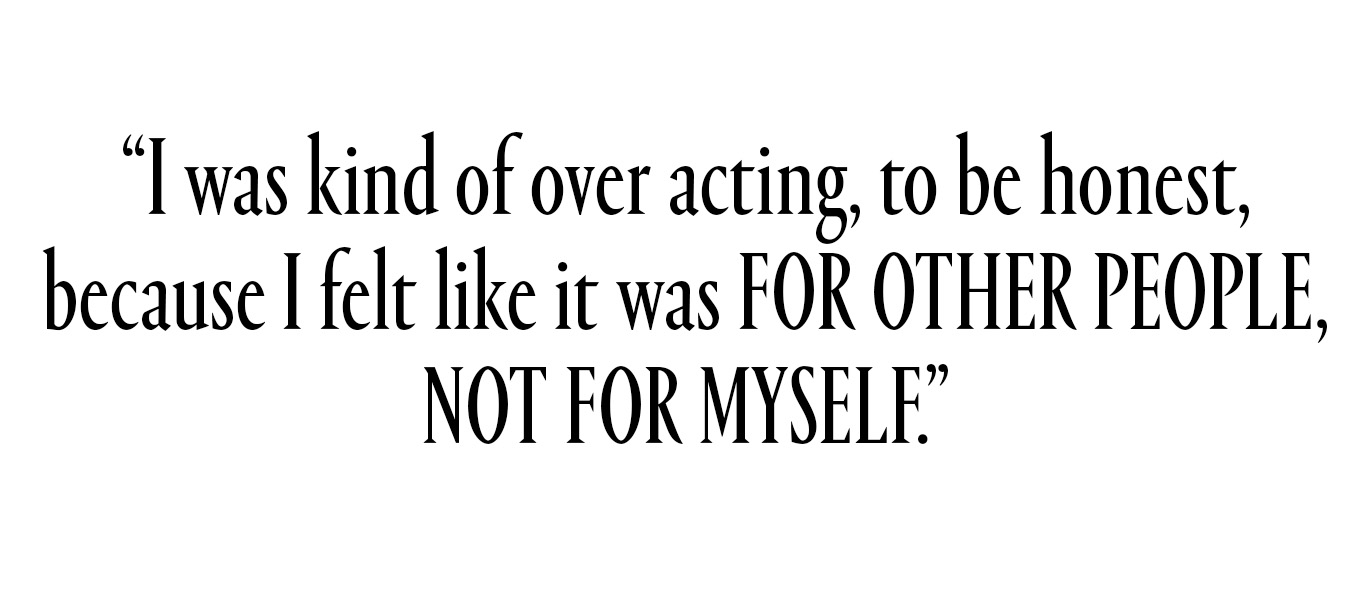
Dunst became such an ardent supporter of Spaeny, she called Coppola to endorse her for the title role of Priscilla. "She was definitely like a little sister to me and still is," Dunst says as the waiter, smiling brightly at her, brings out a complimentary plate of focaccia and tomato.
Civil War continues the fruitful on-screen partnership between Dunst and Plemons, who first met in 2015 when they co-starred as husband and wife on FX's Fargo and later went on to earn his-and-hers Oscar nominations (Plemons for best supporting actor) for The Power of the Dog. When another actor fell through, Dunst recommended her husband to Garland for a small but pivotal role as the unhinged, gun-wielding renegade. "Alex is very lucky that I'm married to...the best actor," she laughs.
The couple, who scarcely interact in Plemons's single scene, slipped right into co-star mode, even on the grueling and unsettling shoot. "Because we fell in love on a set, we fell in love creatively first. I think we'll always come back to that, in a very not-involving-our-real-life way," Dunst says. "And also, listen, we don't talk to each other on set. I left him alone, he left me alone."
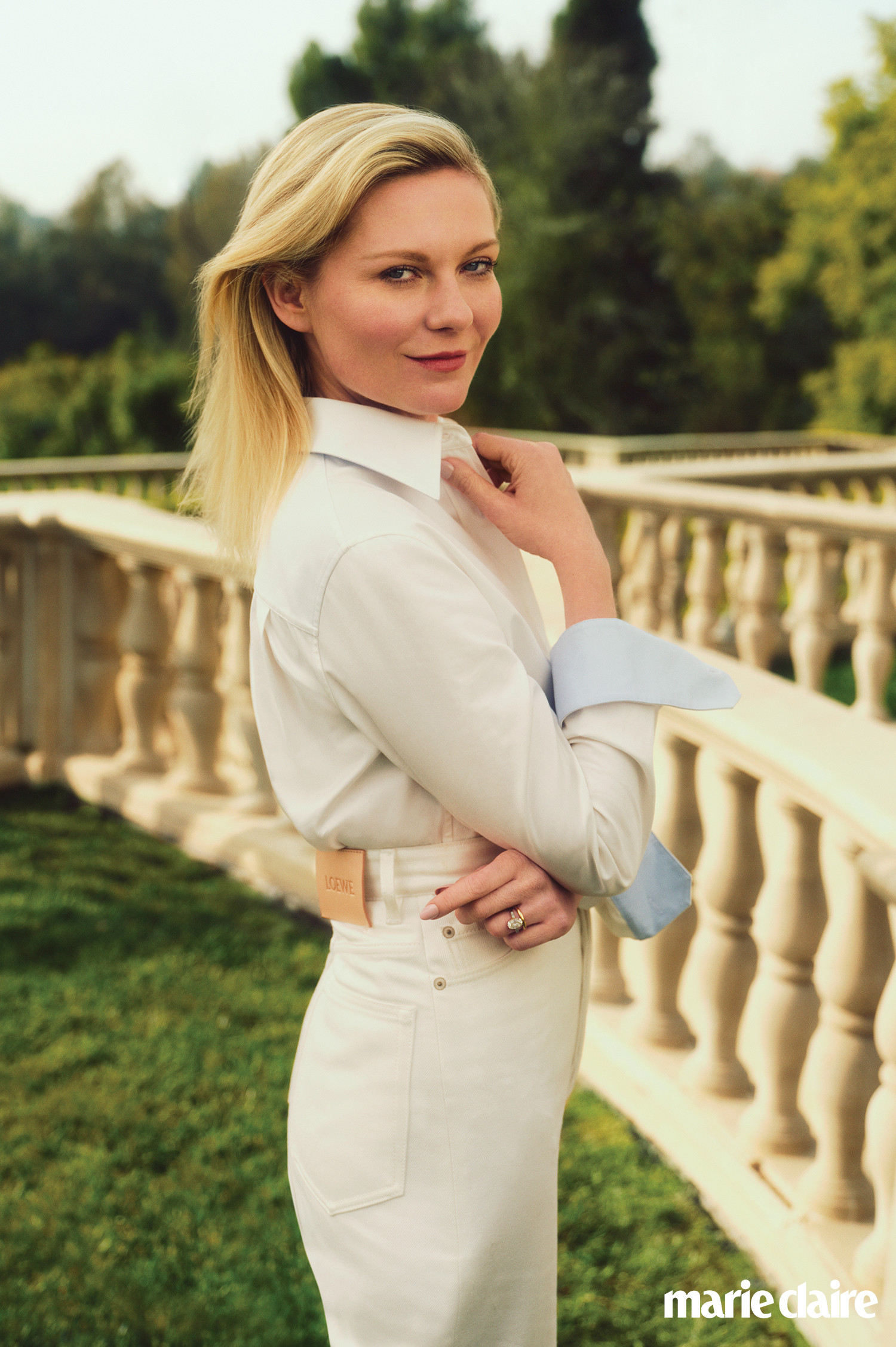
Loewe top, pants
When news of Dunst's and Plemons's relationship first trickled out in 2016, it felt like a pop culture crossover coupling akin to Leighton Meester and Adam Brody's (a.k.a. Blair Waldorf and Seth Cohen). Landry from Friday Night Lights (or Breaking Bad's Todd, whichever your flavor) dating Bring It On cheer captain Torrance Shipman?! Two sons and a wedding in Jamaica later, Dunst and Plemons (who recently appeared in Martin Scorsese's Killers of the Flower Moon) are poised to be their generation's no-drama Liz and Dick.
"I love working with him," Dunst says simply. "What's nice is that we trust each other so much. He sent me a scene last night of this miniseries he's working on to get my opinion. If I'm having a hard time deciding on something, I'll have him read it. I trust his opinion more than anyone, and he cares about me more than anyone." Crucially, "we hate the same things," she adds, cracking herself up, although Dunst won't reveal their cinematic peeves, the Oscar nominations were announced the day before we meet and the couple's favorites are of the foreign arthouse variety. Dunst agrees that Greta Gerwig should have been nominated for directing Barbie, but she isn't swept up in the overall horse race. If anything, she lowers her voice again, "There are too many award shows."
Maybe this is the gift of Dunst's longevity: a firm sense of perspective. Her supporting actress nod was considered long overdue, but she wonders if losing might actually serve her. "I think it's good to be an underdog," Dunst says. "If you [win] Academy Awards, sometimes it's not always good for your career." (Indeed, there is a longstanding curse theory.) It seems characteristically, morbidly Hollywood that Oscars are given all-consuming weight for a season, but the shine quickly fades. For example, Dunst shrugs, "I don't know who won last year." For what she really wants to do—make interesting film with European directors—quality acting matters more than Oscars anyway. Her aspirational "queen of the year" is hardly a household name, but Sandra Hüller, the German star of The Zone of Interest and Anatomy of a Fall.
After the waiter brings out another plate of complimentary focaccia (this time with caramelized onion), Dunst feels badly that we're not ordering anything but espresso, and suggests dessert.
From the outside, Dunst's career evolution appears organic—that she simply grew into the gravitas of adult roles over the course of more than three decades. "No one's life is like that," she laughs, as we dig into fluffy panna cotta, and her past.
"Child star" is a label so charged it borders on tragic. Dunst is one of the few to survive it largely unscathed. At 6, she had an uncredited role in Woody Allen's New York Stories. A year later, she played Tom Hanks's daughter in The Bonfire of the Vanities. No profile of her is complete without mentioning that, at age 11, she kissed Brad Pitt in Interview with the Vampire ("very weird," she later called it). Her other Vampire co-star, Tom Cruise, still sends her a coconut cake every holiday season. Around the same time, Dunst and her family uprooted from New Jersey and moved to L.A.
She's since progressed through at least as many eras as Taylor Swift. There were manic pixie dream girl moments (Crazy/Beautiful; Elizabethtown) blurred with biting comedy (Dick; Drop Dead Gorgeous) and what she calls the "shocking success" of Bring It On at 18. ("I wish I had been a producer," Dunst laments.) Then came the blockbuster coup of Spider-Man, which, in retrospect, Dunst perceives as a "hidden indie," given the trilogy's stacked casts. Her younger son, James, now watches her as Mary Jane, shooting webs and all. "It's cute," Dunst says. She "loves" Zendaya, but hasn't seen the latest incarnations. In her spare time, "I have to go and see the Paw Patrol movie."

Issey Miyake dress; Saint Laurent by Anthony Vaccarello shoes
That Dunst continually flies under the radar isn't some fate that befell her, but a choice all her own. She declined to "capitalize off the Spider-Man thing" to become a "movie-star-movie-star," the kind of popular entity too big to lose herself in roles, and she means that as a compliment to her younger self. "That's great for some people," she says. "It's not the artist that I want to be," she explains, with an emphasis on the word artist. She could be a splashier, more celebrated name, if she wanted to be. But in the middle of her Marvel era, Dunst veered to Marie Antoinette with Coppola. "I didn't go do a bunch of romantic comedies." Instead, she dove into indies like Melancholia with director Lars von Trier. She never sought to reinvent herself, per se: "It was just growing up, and migrating to things that spoke to me." When I ask her again, later, about these early-aughts choices, she replies, "I always just navigated with my heart."
Dunst genre-hopped with the kind of freedom typically reserved for men in Hollywood, but her migration was not as seamless as it may have appeared. In her late 20s, she found herself at a creative crossroads. "I was kind of over acting, to be honest, because I felt like it was for other people, not for myself," she says. That changed when she started training with her acting coach, Greta Seacat, who taught Dunst to tap into her subconscious. Together, they analyze Dunst's dreams to help inform her characters. The process isn't always so linear, but a dream about Scooby-Doo led to memories of the cartoon characters' quick-footed running, which influenced how Dunst walked as her Fargo character, Peggy. The method has given Dunst a new level of confidence in her craft. "You feel so rooted in who you're playing, you can do no wrong," she says. "I don't feel nervous. I feel at home sharing everything on set now."
Looking back, Dunst didn't always feel that level of comfort. "I mean..." she exhales, pauses, then resumes speaking more softly than before. "It was a joke, but on Spider-Man, they would call me 'girly-girl' sometimes on the walkie-talkie. 'We need girly-girl'"—she imitates the cloying tone—"but I never said anything." The memory fires her up a little bit—"like, don't call me that"—but she quickly recovers. It took time to realize her self-worth, especially as a young woman in pre-MeToo Hollywood. "You didn't say anything," she says of being minimized. "You just took it."
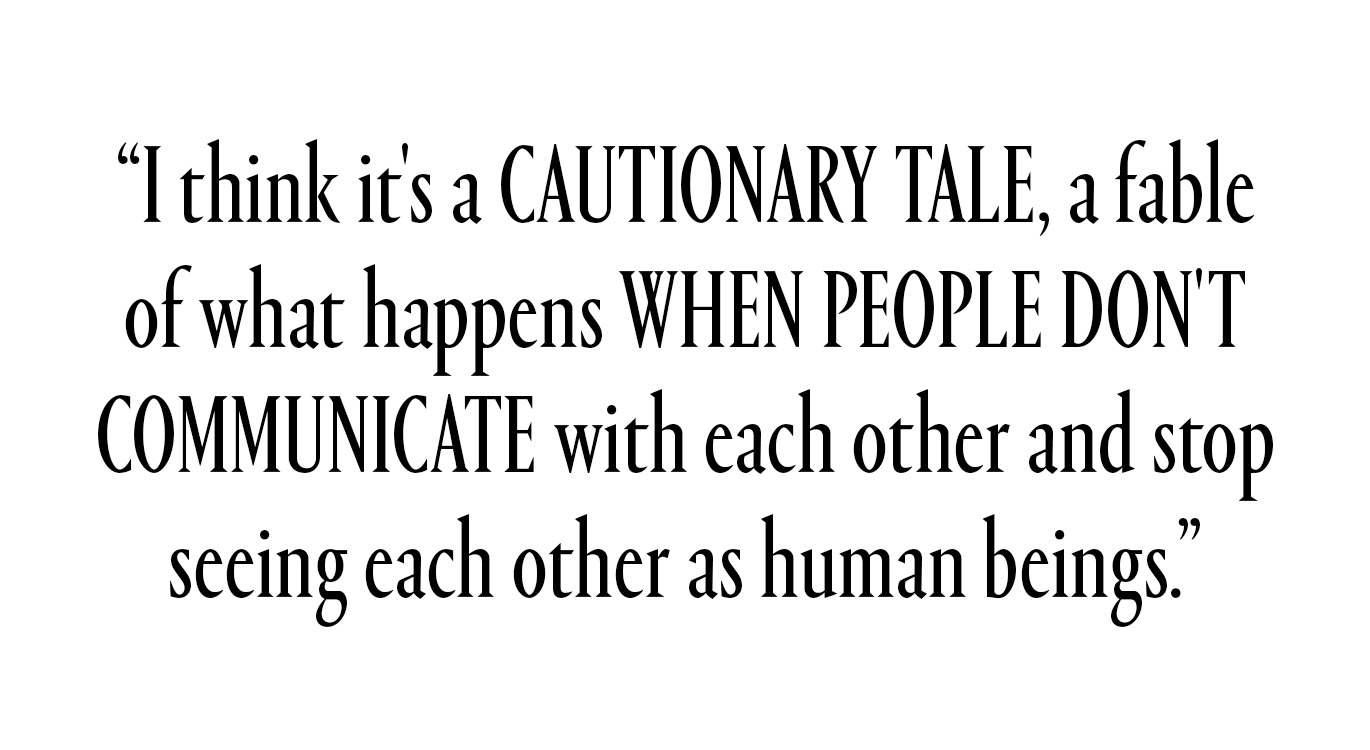
Among her reactions to the movement of women in her industry exposing a culture of abuse: gratitude for the female directors with whom she's consistently worked, starting with Gillian Armstrong helming Little Women (1994). "I saw the power in women very young," Dunst says. "I think that's helped with...not needing male attention in my career." Her decision to work with female filmmakers—including thrice with Coppola, Bachelorette's Leslye Headland, and later, Campion—was a somewhat strategic one. Cognizant of how conventionally pretty blonde looks could work against her with male directors, a younger Dunst told her manager, "I feel like I get hired because I'm someone that they might want to sleep with," even if only in theory. She was, in fact, a dream girl for a generation of men (as well as a crush for straight-girl contemporaries striving for her perfectly imperfect tousled pixie of yore). "I think that's probably why I migrated to so many female directors at a younger age," Dunst says, "because I didn't want to feel that way."
She grapples with different concerns for her career now. In her early 40s, "no one cares" about her looks, Dunst laughs. She's kidding, but maybe not entirely. It's not just the sad mom stuff, but other hints of ageism in the roles coming her way. I struggle to remember which 30-something actress said in the past that she was deemed too old to play a 55-year-old man's girlfriend (Googling later, it was Dunst's Mona Lisa Smile co-star Maggie Gyllenhaal, the sister of Dunst's early-aughts ex, Jake). "I've been offered a lot of roles like that," Dunst winces. "Honestly, it's slightly offensive." Still, she's determined to gracefully grow older in an industry that makes it feel impossible. "I feel insecure like a normal woman, but I also have a good head on my shoulders," Dunst says.
She's navigating this new phase of her career alongside an immersion in mom life. Her priorities have shifted: Now that Ennis is in kindergarten, it's more challenging for Dunst to, for example, relocate the family to New Zealand for a shoot, as she and Plemons did for The Power of the Dog. "I don't want to take my kid out of school for a role unless I cannot say no and it's that incredible," she says. "I just don't want to do that to him." Shooting Civil War was logistically manageable. Her sons, then still in preschool, joined her in Georgia, where a "tribe" including Plemons and both grandmas helped take care of them.

Her current dream is landing a great TV show that films in L.A. Would she ever do another superhero movie? "Yes," Dunst says with refreshing honesty, "because you get paid a lot of money, and I have two children, and I support my mother."
In an attempt to enrich herself outside of acting, Dunst returned to tennis, which she's played since childhood (she isn't too chill to admit she's competitive). Her endgame is playing as a family, hence why Ennis is at his first lesson as we speak. She's also taken up oil painting, based on a love of art that she hasn't always nurtured.
Dunst's lack of ego or controversy after a lifetime in Hollywood should be an award-winning feat in itself: Best Uncanny Ability to be Normal Under Abnormal Circumstances? Growing up here might have deluded her, but instead it seems to have rooted her in what's real; what it takes to last as long as she has. "I just have really good people around me," Dunst says. "I have good girlfriends and my mom's fun and comes over every day. I'm very connected to my family and I have a great husband." She went to a non-actor high school and has had the same core group of friends ever since. "Two of my friends in this industry are Dakota and Elle Fanning, but they're like me," Dunst say. "They're very normal, real girls." That her whereabouts aren't constantly documented via paparazzi walks or social media seems to prove the theory that famous actors can, in fact, maintain a semblance of privacy, if they truly want to.
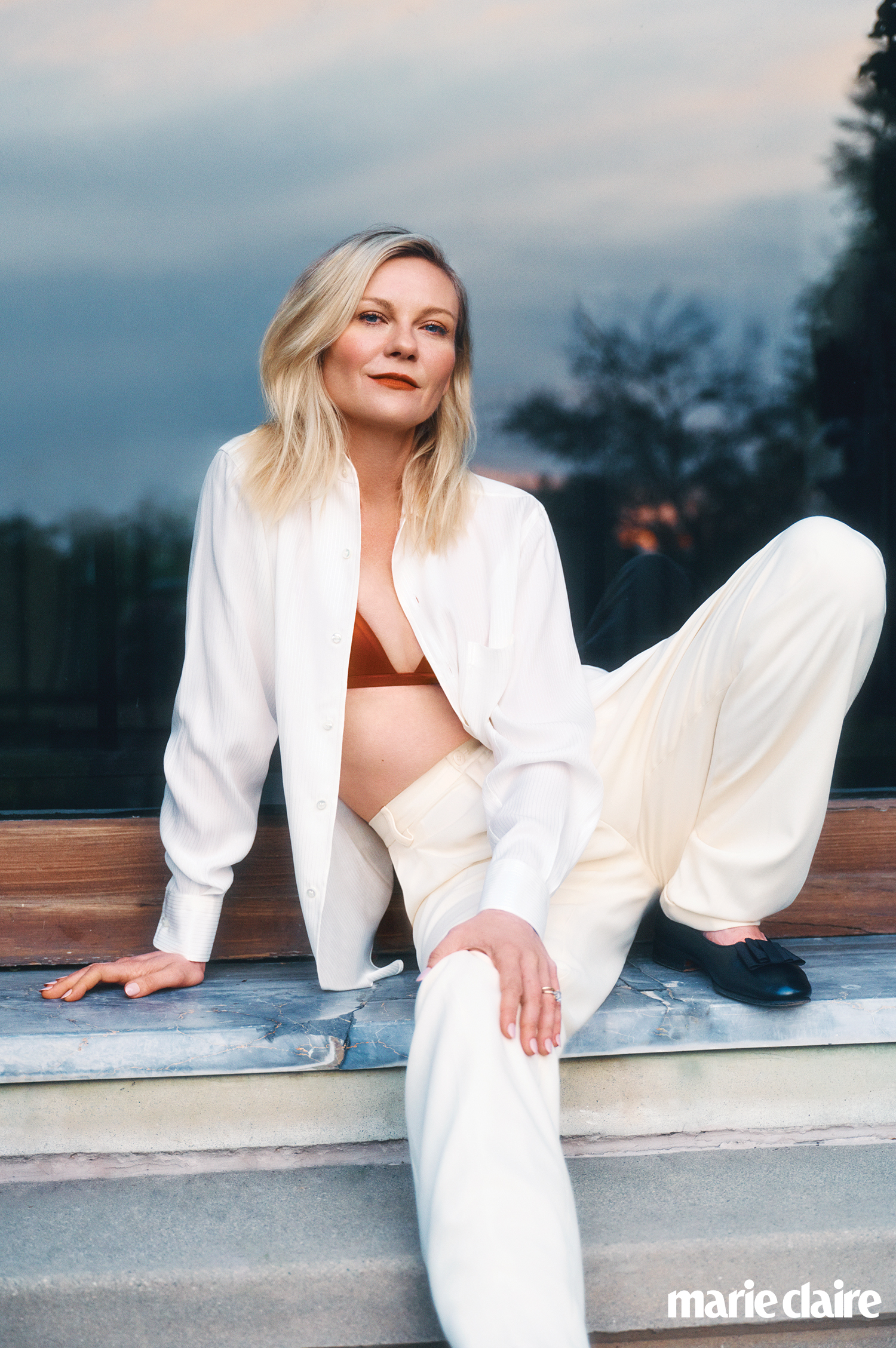
Loro Piana top; Fleur du Mal bra; Ralph Lauren Collection pants; Bode shoes
The kitchen is closing at Angelini, and Dunst has survived her first interview in two years. "Talking about myself is torture," she cringe-laughs. Dunst is dying to see how Ennis's first tennis lesson went, and given last night's shenanigans, she might need a nap. She elicits only a few subtle glances on Beverly Boulevard before heading back to her Volvo SUV.
Where the multifaceted actress and mother of two goes next remains to be seen. Civil War is the only upcoming credit on Dunst's IMDb page, but she envisions her long career stretching even further. It demands faith, and a quiet confidence.
Dunst predicts she just may get that Oscar someday—maybe even in the form of a lifetime achievement award. "I'll be old," she says, "and they'll be like, 'Let's finally give her one.'"
Photography by Jonny Marlow. Hair by Bryce Scarlett; makeup by Pati Dubroff; manicure by Lisa Kon.
This story appears in the 2024 Makers Issue of Marie Claire.
Michelle Ruiz is a contributing editor at Vogue and culture journalist whose work has been published in Vanity Fair, The New York Times, New York, The Wall Street Journal, and others.
-
 Tyla's Coachella Outfit Pairs Dolce & Gabbana With Pandora
Tyla's Coachella Outfit Pairs Dolce & Gabbana With PandoraThe singer wore a gold version of the crystal bra made famous by Aaliyah.
By Amy Mackelden Published
-
 How Kate Middleton Is Influencing George's Fashion Choices
How Kate Middleton Is Influencing George's Fashion ChoicesThe future king's smart blazer is straight out of Princess Kate's style playbook.
By Amy Mackelden Published
-
 King Charles "Couldn't" Meet Prince Harry During U.K. Visit
King Charles "Couldn't" Meet Prince Harry During U.K. Visit"It could actually bring down a court case."
By Amy Mackelden Published
